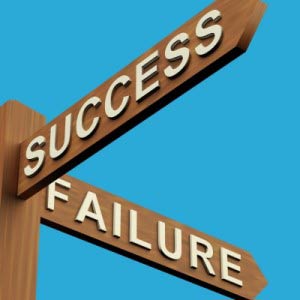Written by Sean McPheat | 

I thought it appropriate to discuss this from the opposite angle today. By asking the question ‘what makes salespeople fail?’ we get a different perspective and identify the consistent traits that occur in people who don’t achieve their goals and objectives. take a look at our top ten and see if you agree and (more importantly) can add to them.
1) They haven’t changed their prospecting methods to match the needs of today’s buyers.
Many salespeople still buy lists, pick up the phone and make their cold calls to people they know nothing about, trying to get them interested in a product they (the prospect) know nothing about and don’t know why they need it. No wonder these salespeople are crying out for tips on how to cold call more effectively…they get rejected more times than they can cope with.
2) They are too reactive.
Many salespeople who fail simply wait for their company to provide them with the leads, then blame the company for providing leads that don’t materialise into sales. They don’t think proactively or make their own leads work for them.
3) The main emotion that they rely on is hope.
They hope this deal will materialise after they have sent a proposal. They hope their website will bring in scores of enquiries. They hope their pipeline will fill up, even though they haven’t spent any time nurturing it. Hope, hope, hope.
4) They blame everything else for their failures, without looking at what’s in their sphere of influence.
We often can see a failure a mile off; they’re the ones who blame other things for their problems (the economy, the competition, their boss, the products they sell, the leads, etc, etc) instead of thinking about what they can influence and affect.
5) They live in Pity City, instead of just visiting and passing on.
My trainers often tell me they deal with salespeople who want answers but then criticise every possible solution with the proverbial ‘Yeah, but….’
Many people have every right to feel pity for themselves because of what is going on within their company or because their competition are wiping the floor with them. But we need to see what can be done to progress, rather than living in a state of mind that keeps us trapped in feeling sorry for ourselves.
6) They don’t manage their time effectively.
Time is one of the most important things you have to work with. Too many salespeople don’t invest their time effectively enough. You can be really busy, really efficient, but it doesn’t always equate to effectiveness. Salespeople who fail don’t think hard enough how their time can be utilised to assist themselves and their clients
7) They don’t utilise their phone skills well enough.
The phone is a great ally for salespeople, but many think they should try to sell using it. Today’s modern buyer is very wary of making any decision, and it’s rare to find someone deciding to make a big change over the phone. The failure comes by not knowing the true use of the phone, which is to confirm arrangements, build interest and create desire.
8) They fail to engage clients
Many failures occur because salespeople are unable to describe what life will be like when the customer is actually using the product or service. The salesperson still thinks that waxing on about the features and benefits will make the prospect leap for joy and wonder how they had got by without the product. With no engagement, the buyer loses interest and stalls or brings up objections. They need to see how their business will be different, how things will be better, what problems will be solved. No engagement means no decision.
9) They don’t know how to split their time between hunting and farming.
Farming for new business from existing clients is important. So is hunting for business from new prospects. Knowing how to differentiate between the two, and what support existing users need from you, is vital to create good use of time.
10) They have forgotten how important it is to constantly learn, grow and develop.
Most learning in sales occurs in the field, in the real world. How many books have you read in the last 12 months that can make a real impact on the way you serve your clients? How many times have you shared learning experiences with colleagues or your boss and changed your approaches to make sure you develop your skills?
Many failures don’t take their skill development seriously and consider that things they learned 5 or 10 years ago will suffice in today’s world. Sorry…they won’t. Failing to recognise that sales is a developing business is the same as thinking that the buyers who were around 5 or 10 years ago are still here today.
These are my ideas of what makes salespeople fail. Add your own and let me know them. I’ll compile a list and publish them soon.
Before I sign off, here are some more tips on becoming a great sales person:
As a Sales Training Provider, we can help you with our wide range of Sales Courses that can help you.
Happy Selling!
Updated on: 4 June, 2013
Related Articles

Search For More
